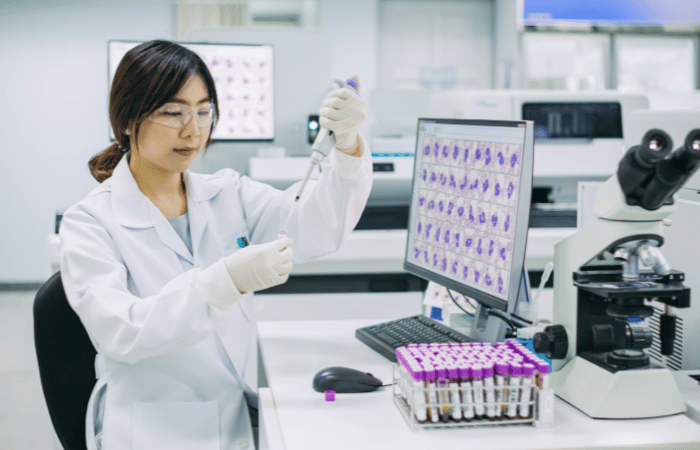May 2023: Chimeric antigen receptor (CAR) T-cell therapy is an innovative development in the field of individualized cancer therapy. The patient’s own T-cells are genetically modified during the manufacturing process to express a synthetic receptor that binds to a tumour antigen. The patient’s body is then infused with CAR T-cells that have been grown for clinical usage and are ready to fight cancer cells. Even though CAR T-cell therapy is regarded as a significant advancement in cancer immunotherapy, it is not without drawbacks.
Chimeric antigen receptor T-cell (CAR T-cell) therapy is a ground-breaking component in the treatment of hematologic malignancies. Six CAR T-cell therapies have currently been approved by the US Food and Drug Administration (US FDA) (axicabtagene ciloleucel, brexucabtagene autoleucel, idecabtagene vicleucel, lisocabtagene maraleucel, tisagenlecleucel, and ciltacabtagene autoleucel), but only one (tisa-cel) is offered in Korea. In this study, we talk about the difficulties and obstacles that CAR T-cell treatment is now facing in Korea, such as the difficulties with patient accessibility, cost, and reimbursement.
In 2021, a lot of Korean businesses jumped into the development of CAR-T therapies. Industry insiders claim that local biopharmaceutical companies are excited with the local approval of Novartis’ CAR-T therapy (ingredient: tisagenlecleucel).
By introducing chimeric antigen receptors into immunological T cells, CAR-T therapy is a type of cell therapy that targets cancer cells. It is sometimes referred to as a “miracle anticancer drug” due to its remarkable response rate.
Its production is a laborious process that includes gathering the patient’s T cells at a hospital and cultivating them in a facility that follows good manufacturing practises (GMP).

CAR T-Cell production and administration process
Tisa-cel, the sole commercially licenced CAR T-cell product in Korea, is an autologous personalised cellular therapy that requires leukapheresis operations prior T-cell donation from the patient. The fabrication of these cells is subsequently entrusted to licenced manufacturing facilities (in other hemispheres). The finished products are sent to hospitals for patient infusion following manufacturing and quality inspection [2]. Patients face a big obstacle due to the administration technique and CAR T-cell production’s intricacy. Limited production slots can prevent the execution of succeeding processes since production is strongly dependent on the workforce of the manufacturers, while supply chain interruptions sometimes cause unforeseen delays.
The absence of accredited CAR T-cell treatment facilities is yet another significant issue with patient accessibility. CAR T-cell treatment already consumes a lot of resources because it calls for a large number of highly skilled professionals and a reliable infrastructure [3]. There is a need for an intensive care unit, a leukapheresis facility, enough cell storage, a structured clinical unit with defined protocols to monitor and manage patients developing acute problems, and a clinical unit with well-organised work areas. Haematologists, devoted critical care medicine specialists, neurologists, and trained nurses are constantly required in terms of medical staff. The Korean Ministry of Food and Drug Safety must also evaluate all centres planning to provide CAR T-cell therapy in accordance with the “act on the safety of and support for advanced regenerative medicine and advanced biological products” and “enforcement decree of the act on the safety of and support for advanced regenerative medicine and advanced biologic products [4]. As a result, Seoul is physically home to the majority of Korea’s CAR T-cell therapy facilities, adding to the already existing restrictions.
High cost & CAR T-Cell therapy production in Korea
The high cost of the medication developed by multinational pharmaceutical companies makes it difficult for Korean patients to access it. As a result, Korean businesses have created and localised CAR-T treatments in an effort to address these issues. Many businesses have either begun developing CAR-T therapies or declared their intention to do so, including Curocell, Abclon, GC Cell, Ticaros, Helixmith, Toolgen, Cllengene, Eutilex, and Vaxcell Bio.
As the first Korean company to begin a CAR-T treatment clinical trial in Korea, Curocell received approval from the Ministry of Food and Drug Safety in February for a phase 1 clinical trial of CRC01, a CAR-T treatment candidate.
The company has used its unique technology known as “overcome immune suppression” to develop CRC01, a CD19 CAR-T therapy that inhibits the expression of immune checkpoint receptors, PD-1 and TIGIT.
Following the recruitment of patients with diffuse large B-cell lymphoma who had relapsed or been refractory after two or more rounds of systemic chemotherapy, the company is currently carrying out the trials at Samsung Medical Centre. The company Curocell, which started the treatment in April, recently stoked anticipation by releasing the preliminary findings of its phase 1 lowest dose cohort data.
At101 is a CD19 CAR-T therapy candidate, and Abclon had submitted their investigational new medication application for a phase 1 trial in June. Patients with relapsed or resistant B-cell non-Hodgkin’s lymphoma are the target population for the company.
Regulators have yet not given the corporation the go, though. GC Cell intends to develop its CAR-T treatment in the United States, unlike Curocell and Abclon.
Through Novacel, it intends to carry out a clinical trial for a mesothelin-specific CAR-T therapy. Additionally, the company wants to handle solid cancers.
Major university hospitals have begun researching CAR-T therapies and are getting ready to set up related infrastructures, so interest in CAR-T therapies is not limited to businesses.
The first CAR-T cell treatment facility in the nation debuted in April at Samsung Medical Centre. The Seoul St. Mary’s Hospital and Eutilex inked an MOU in September to work together to develop a CAR-T therapy.
Additionally, earlier this month the Ministry of Food and Drug Safety and the Ministry of Health and Welfare gave Seoul National University Hospital their blessing for a clinical trial of CAR-T therapy for paediatric patients with relapsed/refractory acute lymphoblastic leukaemia.


